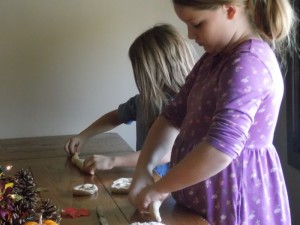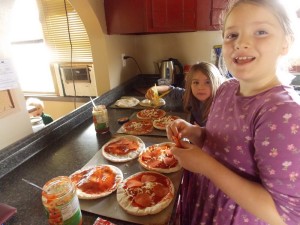 How often do we hear that children come first. But is it true? Is it possible that this policy is backfiring, and doing more harm than good?
How often do we hear that children come first. But is it true? Is it possible that this policy is backfiring, and doing more harm than good?
Over and over we read articles that remind us as parents to put your children first. They are more important than anything else. On the surface this sounds like good advice, but in real life it can be taken too far. Children should not be allowed to monopolize the parents’ lives to the extent that it is doing more harm than good.
Yet, the welfare of the children is the top priority. What do we mean by welfare? Children need food clothes, shelter, and love. But they also need to learn to submit, to obey, and to sacrifice for others. They should not have ALL their wants supplied and wishes granted. This makes for selfish children.
We are not being fair to our children if we do not introduce them to life’s realities. We are not being kind to them if we let them dominate our lives–if we let them grow up thinking the world is going to revolve around them! It won’t! It is best for them to learn this when they are young and of impressionable age.
As parents go about their work, they should allow the little ones to help, but they will need to set limits. How can we go about doing that? By including them in our work.
Baking day
Let’s start with baking day. Gather your basic supplies on the table, then position yourself so that you are facing your children’s main play area. Then if they tire of helping you, you can still make eye contact with them as they go about their play. Put chairs on your side of the table so that you are within reach of accidents or can lend a helping hand.
Next on your list is to set limits. No child climbs up onto the table for any reason. No walking about the kitchen with bowls of batter or lumps of dough. Insist that they do the baking prep around the table.
Let’s start with an apple pie. Each child that wants to be involved hand out a pie plate and a butter knife. Now Mom’s hands must fly while those apples are peeled and chopped into sections for the children to then cut themselves. Tell your children a story while you are cutting up the apples. Share a bible story, or a character building story. Tell them something you did when you were growing up. Children love to hear their parents tell them things they did as a youngster. Of course give pieces of apple to the little ones first, as they will have a harder time waiting. This is an excellent time to teach your children about sitting still and waiting turns.
After you have a bowl full of apples peeled, you can pass them out to your children and let them slice the apples as you prepare the pie dough. Let them cut with butter knives and a cutting board. It won’t matter if some of the pieces are larger than others, it will give your pie some variety. Little hands can mix up some sugar and cinnamon and they will love to sprinkle that on their own pies. If you don’t have many different pie plates, let your child make them and put them into muffin tins to make “mini” pies. Let those go into the oven first and then they can have them as a snack for the day. Let them enjoy the “fruits of their labor.”
By now the novelty of baking may have worn off and you can mix up and make your other baking items without much assistance. Watch your children and remark about their play, but stay at your work. If the two year old has a block, tell him to line it up and make a fence for his animals. If the 3 year old has a doll, tell her to get the pink blanket to wrap the baby in and ride to church.
When you have the muffin batter mixed, call the oldest two back from their play and let them grease the muffin tins, or put in paper cups, and then let them spoon the batter into the holes. If they can trust you to let them help you with interesting jobs, then they will not be underfoot all the time. Mothers who try and do the jobs quickly while the children are “out of they way,” find that they are in the way most of the time. Now the muffin bowl is empty.
The lunch crackers just came out of the oven. Each little helper can carry a cracker back to his play. These crackers consist of pie dough rolled very thinly and then sprinkled with sugar, pricked with a fork, and cut into any shape. Let one of your older children make these from dough scraps.
No time to bake for your family? Do not try and bake everyday. During the winter, one baking day a week is enough. Most of the work is in gathering your supplies. Once you have all of your supplies ready it does not matter if you make one pie or 5 pies. Make enough baked goods to last you for your week.
Sewing Day
Are you ready for a day of sewing? Try to do the cutting while the baby is napping to prevent a strain on your patience. Remember one thing your children do not like to do is see your back. Try and position yourself so that you will be facing your children while working.
What can you do to help keep your little ones occupied while sewing? You can make some simple lacing cards for your children while you are sewing. Take a cereal box and draw a simple shape, cat, barn or duck. Punch some holes around the shape and then give your child a shoe lace to sew around the picture.
You can also use this time to let your child learn embroidery. Give your child a scrap piece of material and draw a simple shape onto it. You can make a heart, a house, a flower, etc. Something simple and basic. Give your child a needle and some embroidery thread, let them try and do some simple stitching through the drawing.
Whatever the activity remember to comment about the children’s work periodically or ask them to do something for you. This keeps them involved. While you tend to the baby, the 4 year old can help sweep up around the sewing machine. The children can also wash the dishes, set the table, and fold towels and washcloths.
I could go on about how you can include your children in your daily work, but I hope the message is clear. Children are not to be shoved aside while work is being done, then brought out at a convenient time to be “raised.” Since the needs of the children create most of a Mother’s work, she does not need to feel guilty for being busy with these duties. By including the children in everything she does, she is teaching them important values that will help them all their lives.
A child’s personality is extremely mold-able at a young age. We as parents need to help encourage that mold in the right direction. If the children are taught to believe that they come first, they will believe that everyone should cater to their wishes. How will they learn to get along with other children? How will they learn to put God first in their lives, if they spent the first 15 years of their life believing that they come first?
Yes children do come first before fancy curtains, freshly painted houses, manicured lawns, and elaborate flower beds. But children should not come before respect for parents and love for God.
It used to be that when a mother had a little girl begin school, the mother used to say, I don’t know how I will get along without her, she is such a big help. Now mothers are saying in an exasperated tone, I am so glad that she finally gets to start school, she hardly knows what to do with herself anymore.
We need to be training and teaching our children to enjoying working in the ever day tasks. Mothers please do not let your children sit and play while you are off doing the housework and baking. I know that it can be more stressful at times to include little ones, I agree 100% that it is way faster and cleaner to do the job yourself. But what is that teaching our little ones? How will they learn to be part of the family if not allowed to contribute to household tasks?
Make a commitment today to start investing in your child’s life by including them in your daily household tasks.










3 responses to “Who comes first???”